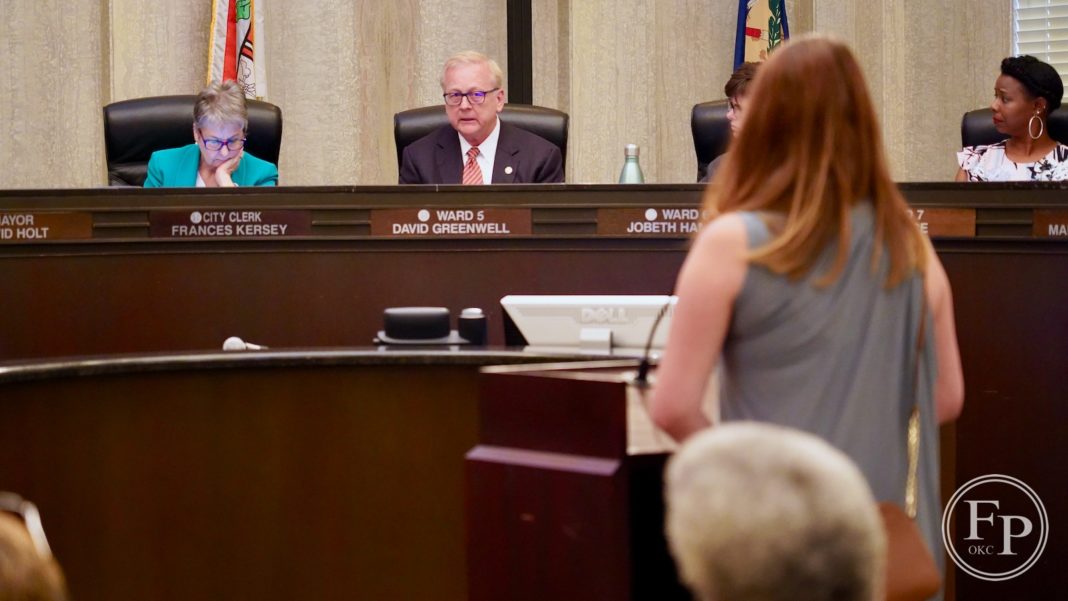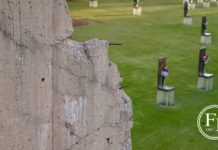Last Updated on July 3, 2019, 7:15 AM | Published: July 2, 2019
If some members of the OKC Council prevail, the Historic Preservation Commission won’t be allowed to initiate a historic designation process when the property owner objects.
This comes after the City Council voted 4-3 Tuesday to change an ordinance that had previously allowed the Historic Preservation and Planning Commissions to initiate a proposal for the City to designate a historic district in any circumstance.
Mayor David Holt did not vote due to being out of town on City business.
According to a late post on Holt’s Twitter account, the draft now goes to the Planning Commission and the ordinance change will take place after multiple hearings in future Council meetings.
Those future procedures were not made clear in the proceedings Tuesday.
If the measure stands up to future scrutiny, the only way the Historic Preservation Commission or the Planning Commission can initiate a proposal for designation is if over 50% of the owners of the parcel or if neighborhood associations ask for the designation.
Council members voting for the change were James Greiner, Todd Stone, David Greenwell, Mark Stonecipher, and Larry McAtee (chairing the meeting and voting from the Mayor’s seat).
Council members against the measure were James Cooper, JoBeth Hamon, and Nikki Nice.
The vote came after a sometimes-contentious debate among Council members and even between two Council members and citizens who were there to speak to the motion.
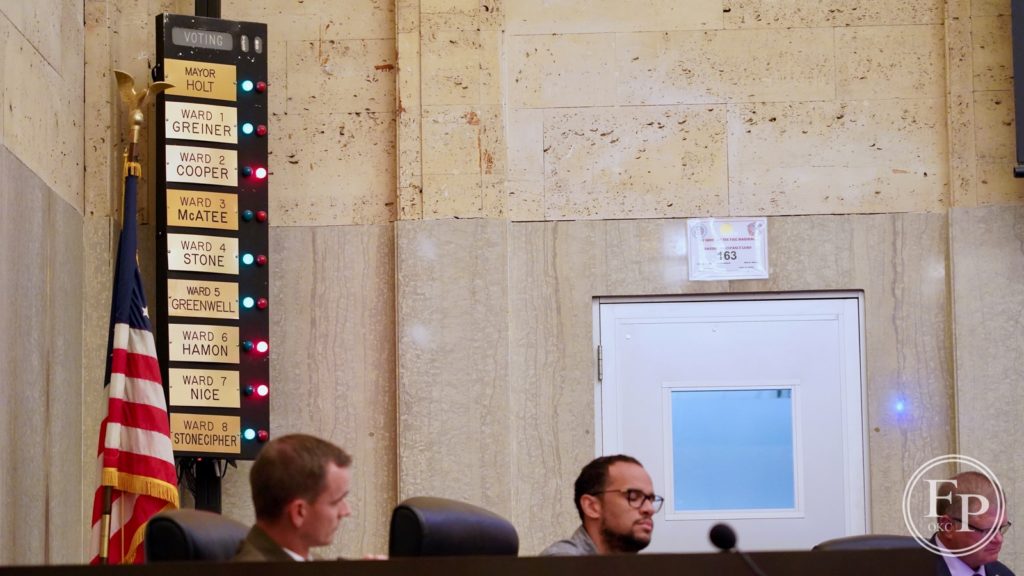
Irregularities
In a diversion from previous courtesies of the Council, Councilmen David Greenwell and Mark Stonecipher both engaged in debates with those citizens who were speaking against changing the ordinance, sometimes sternly attempting to talk over the citizens. (See the embedded video below that starts with the introduction of the item.)
Another irregularity of the vote was the last-minute insertion of a new version of the amendment that was different from the proposed amendment to the ordinance still listed in the online Council Agenda even up to publication time of this report.
In the video, close to the time to vote, Councilman Stonecipher can be seen holding up the following new version of the amendment to the ordinance and identifying it to others on the horseshoe as the one “that was passed out to you today, here.”
Following is the new version not previously attached to the online agenda and not available to the public or the press. It’s the version that was voted in, 4-3.
Amended-amendment-passed
Following is the version that was attached to the online agenda not voted on today:
OKC-Council-Res-Hist-Pres-2
Argument for change
The argument for change from Stonecipher and Greenwell hinged on a U.S. Supreme Court ruling in the case of Knick v. Township of Scott, Pennsylvania, and on the recent contentious situation of the possible sale of First Christian Church property in Oklahoma City at 3600 N. Walker.
In light of the Supreme Court case handed down June 21, Stonecipher and Greenwell both warned that if too many different entities in city government were allowed to initiate historic preservation proceedings to protect a property against the owner’s wishes, they could now take the city directly to federal court.
Stonecipher especially was focused on avoiding the expense and time of federal-level litigation. The argument was consistent with his past on the council where he has been a strong proponent of the city’s avoiding litigation.
Both raised the specter that the actions by multiple city entities initiating a proposal for historic designation could be considered “taking” and infringing on a citizen’s property rights as defined in the 5th Amendment of the U.S. Constitution and make the City vulnerable to a Federal lawsuit without even having to first go to state court.
The “taking” of property language is at the end of the amendment more commonly known for the immunity it gives to individual self-incrimination.
The 5th Amendment, in whole, says:
No person shall be held to answer for a capital, or otherwise infamous crime, unless on a presentment or indictment of a Grand Jury, except in cases arising in the land or naval forces, or in the Militia, when in actual service in time of War or public danger; nor shall any person be subject for the same offence to be twice put in jeopardy of life or limb; nor shall be compelled in any criminal case to be a witness against himself, nor be deprived of life, liberty, or property, without due process of law; nor shall private property be taken for public use, without just compensation.
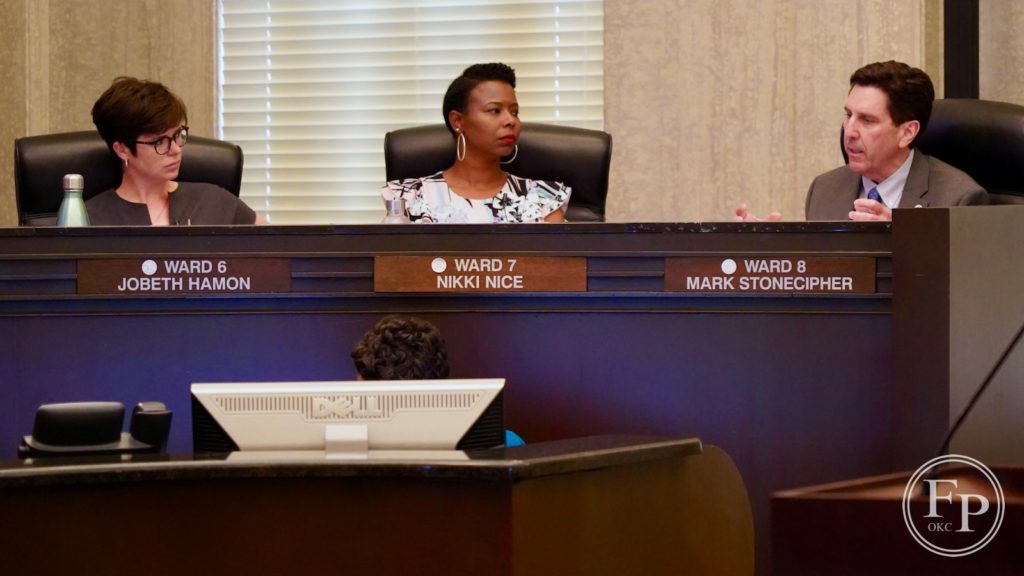
The duo also based their argument on the recent situation where the First Christian Church of Oklahoma City, a dwindling congregation of only about 40, was attempting to sell their 31 acres to a party the neighbors feared would heavily develop and maybe destroy the historic “Eggshell Church.”
The congregation planned to take the proceeds and relocate to a smaller facility so they could continue their ministry according to Stonecipher.
Considerable debate went on at the time about whether the church had been poorly treated in the situation, threatening their collective property rights with a historic preservation district designation.
In that case, Councilmen Stonecipher and Cooper, whose ward the church is in, negotiated a deal between the First Christian congregation and Crossings Community Church.
Crossings is in Stonecipher’s ward in far northwest OKC and was not the original entity negotiating with First Christian.
First Christian had applied earlier for the historic designation, but it was only for the few acres of their property where the unique church structures are located.
Council members opposed
Cooper and Nice carried the bulk of the argument from the horseshoe on the other side of the Greenwell and Stonecipher argument.
Cooper argued that in the case of First Christian he had heard anxieties about the First Christian property as he was knocking doors in the ward during his campaign.
He argued that because the neighbors didn’t know who was negotiating to buy the property the mystery alarmed them even more.
Cooper said he was glad that he and Stonecipher had worked out a deal with Crossings, but that wasn’t the party who was originally negotiating with the First Christian congregation.
Nice argued that the council members would have to guess about how to designate or not designate a structure as historically significant if preservation specialists were left out of the equation.
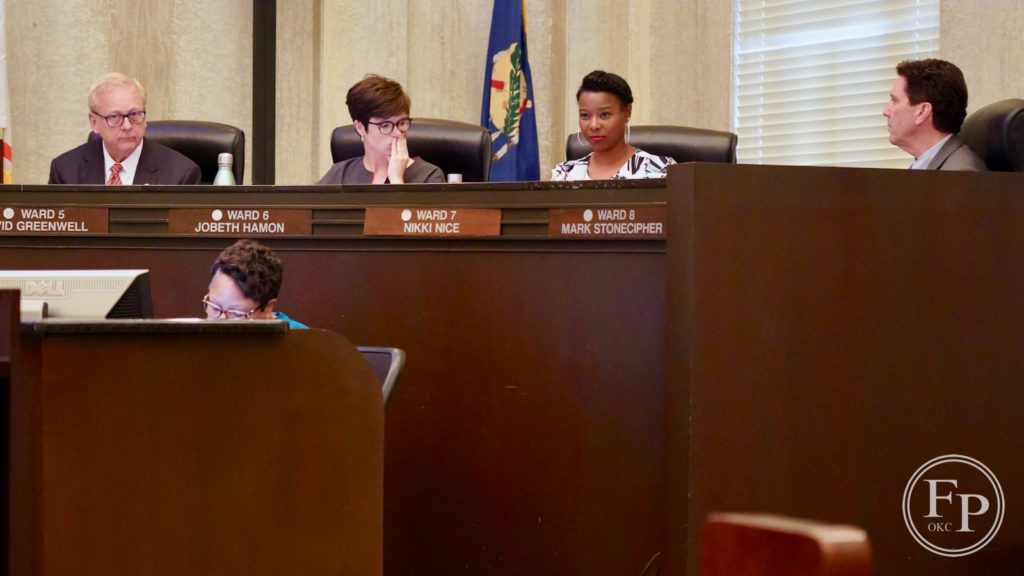
Citizens opposed
Cayla Lewis, executive director of Preservation Oklahoma and Melissa Hunt, executive director for the American Institute of Architects, Central Oklahoma Chapter provided citizen arguments against the motion.
Both argued that the Historic Preservation Commission and other commissions in city government are comprised of citizen volunteers appointed by the Mayor due to their specialized knowledge and/or experience.
And both emphasized that the Council has always had the final decision on such a designation.
“The city council ultimately has the decision to make that change or to make the decision,” said Hunt. “And so with this item, I just don’t understand the need for that ordinance.”
“I would also be curious about knowing … what the training might be for city counselors for this,” said Lewis. “It’s taking away additional review from these commissions.”
“I also will say that the HP commission aides in the process and helps with the due diligence which you had talked about before,” Lewis said.
Advocacy for speed
Both Greenwell and Stonecipher eventually argued the cost of time spent waiting for the HPC to do a study and get it to the Council, which was a departure from their earlier arguments about lawsuits and unfairness to a small church congregation.
“What we’re trying to avoid is the eight-month delay and the expense of that eight-month delay before we ultimately vote on it,” said Stonecipher.
Comments after the meeting
Free Press asked Stonecipher through a message Monday to arrange for an interview after the Tuesday meeting, but he did not respond.
We interviewed Hunt and Lewis after their appearance before the Council.
“We need to be more proactive about the way we approach preserving, securing, protecting and saving Oklahoma’s and Oklahoma City’s important structures,” said Lewis. “One part of our proactive tool is a little bit eliminated, but I think we can continue to fight and can continue to do our research and our work to put historic properties in the forefront of these discussions before it is too late.”
Hunt described the measure as “an unnecessary kind of a knee jerk reaction to what happened with First Christian.”
“We lose too many things here in Oklahoma City,” said Hunt. “And we think this is a step backwards.”
Update: In its first 30 minutes online, this report read as though the whole process of changing the ordinance was at an end. It is not and we have changed the language to reflect that. The flow of proceedings Tuesday did not reflect the future process for changing the ordinance.
Founder, publisher, and editor of Oklahoma City Free Press. Brett continues to contribute reports and photography to this site as he runs the business.
